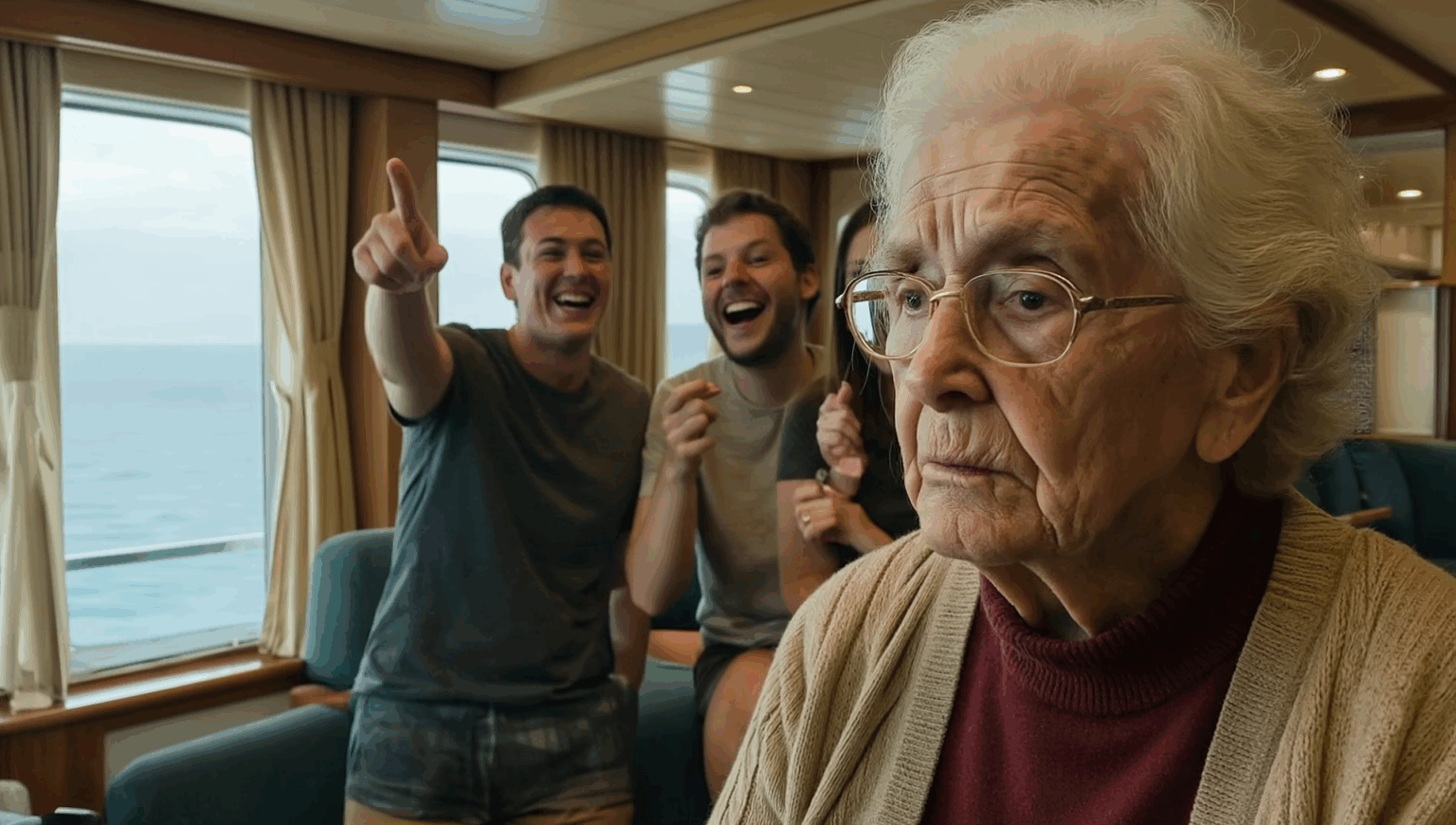“I’m sorry, but there’s no way she belongs here,” snapped the man in the linen blazer, motioning toward the older woman quietly sipping water by the window.
The server froze, glancing from the man to the woman. “Sir, she has access to the VIP lounge. Her wristband is valid.”
“It must be a mistake,” he huffed. “This is for gold-tier guests. That woman looks like she just wandered off the street.”
The woman, Esther, sat quietly in a well-worn cardigan and sandals. Her small suitcase sat by her feet. She looked down at her tea as more guests began whispering.
“Maybe she won some contest.”
“Or got bumped up by accident.”
A couple nearby stood up and asked the staff to move them elsewhere. A younger woman laughed and said, “She probably thinks this is the buffet.”
Esther turned to the server and whispered, “If it’s too much trouble… I can leave. I spent years saving for this cruise, but I understand. I don’t want to make anyone uncomfortable.”
The server opened her mouth to respond, but someone else spoke first.
A deep voice, firm and measured, came from behind them.
“No, ma’am. You’re exactly where you’re meant to be.”
Everyone turned.
The captain of the ship had entered the lounge.
He walked straight toward Esther, took off his cap, and smiled.
Then he looked around the room and said:
“This woman isn’t just a guest. She’s the reason this ship was built in the first place…”
A thick silence fell over the room. The man in the linen blazer blinked. “What do you mean?”
The captain placed a gentle hand on Esther’s shoulder. “Would you mind if I told them, ma’am?”
Esther looked up, cheeks pink. “If you think it’s worth telling.”
“I do,” he said softly. Then he turned back to the guests.
“Ladies and gentlemen, this is Esther Klein. Most of you don’t recognize the name, but many people in the maritime industry do. She’s an engineer. Well—was. Retired now. But years ago, she was part of the design team that developed the stabilizing system used on this very ship.”
A few heads turned in surprise. The man who had complained narrowed his eyes. “She’s an engineer?”
“Not just any engineer,” the captain continued. “The kind who broke rules quietly and changed things from the shadows. Esther worked for Maritech Systems in the 1980s and ‘90s. Back when women in that field barely got their names on documents, let alone recognition.”
Esther tried to wave him off, but he smiled gently at her.
“She’s the one who first proposed the dual-keel counterbalance system. The one that lets this ship remain steady during high swells without needing those unsightly side stabilizers. You ever notice how smooth the sailing is, even in open water? That’s her legacy.”
Now the whispers in the room had changed.
“She built the ship?”
“No,” the captain said, hearing one. “She gave it its legs. And she did it while being underpaid, overlooked, and, let’s be honest, underestimated—just like now.”
The young woman who’d made the buffet comment looked down at her feet.
Esther finally spoke. “I didn’t build the whole system myself. I was on a team. But yes, I helped design parts of it.”
“You led that part,” the captain corrected. “And that’s why, when I saw her name on the manifest, I made sure she had full VIP access. It’s the least this company could do. In fact…”
He reached into his pocket and pulled out a small velvet box.
He opened it and revealed a silver pin shaped like the ship’s hull, with a sapphire in the center.
“This is our Maritime Heritage pin. Only awarded to those who’ve made a historic contribution to ocean travel. Esther, with your permission, I’d like to present it to you.”
The room was silent as Esther took the pin with trembling hands.
“Thank you,” she said softly, her voice cracking. “I never thought I’d actually sail on one of these. I always dreamed of it.”
“You deserve more than a dream,” the captain replied. “You deserve a thank you.”
The man in the linen blazer shifted awkwardly and sat back down. He didn’t say another word.
Later that evening, as the sun set over the water, Esther stood on the upper deck, quietly watching the horizon.
A woman approached her—a different one than before. She looked to be in her thirties, with a little boy clinging to her hand.
“Hi,” the woman said. “I just wanted to say… I’m sorry for earlier. I was one of the people whispering. I shouldn’t have judged you.”
Esther smiled gently. “Thank you. That means a lot.”
“My husband works in aerospace,” the woman went on. “And he always says how rare it is for women like you to get credit. I told my son about you tonight. He’s six. He wants to be an inventor.”
Esther bent down to the boy’s level. “Then you be a curious one. Ask questions. Don’t let anyone tell you who belongs where. Not even grown-ups.”
The boy nodded, wide-eyed.
